Selling To Sellers
- By Gaurav Nandi
- August 27, 2025
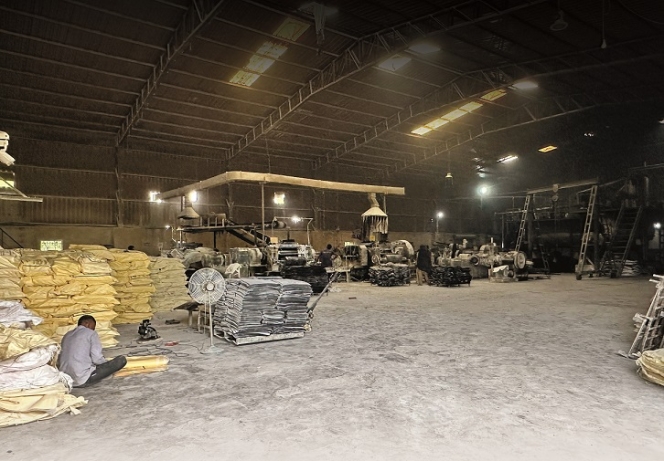
For decades, China has stood as the world’s dominant supplier of raw materials across industries, making it a significant player in the global supply chain. However, Gujarat-based Lead Reclaimed Rubber, an Indian MSME, has achieved a remarkable feat by exporting reclaimed rubber crumb to Chinese manufacturers. The company capitalised on India’s abundant scrap tyre supply and favourable policies, tapping into China’s massive demand for reclaimed rubber. As Lead Reclaimed Rubber continues to expand its production capacity and export markets, the company also faces challenges such as labour shortages, supply delays and regulatory concerns. Despite these obstacles, it remains optimistic about its growth prospects.
China has been the largest supplier of raw material for every industry known to man since decades. While there are many companies in different markets trying to sell back to China, an Indian MSME has unachieved the feat of selling to the ‘seller’.
Gujarat-based end-of-life tyre (ELT) recycler Lead Reclaimed Rubber has been exporting its reclaimed rubber crumb to Chinese manufactures. Commenting on how the company achieved this feat, Chief Executive Officer Jayeshh Patel told Tyre Trends in an exclusive interview, “China is the largest importer of reclaimed rubber, sourcing the material not only from India but also from countries like Vietnam and Sri Lanka. This demand is driven by a vast domestic market for tyres and inner tubes, with numerous brands operating in the aftermarket segment as well as in OEM manufacturing. As a result, the growth potential is significant.”
“While China has its own reclaim rubber plants, it faces limitations due to inadequate scrap tyre availability. In contrast, India has an abundant supply of scrap tyres supported by both domestic generation and strong import volumes. Additionally, India’s favourable government policies and the availability of skilled labour further enhance its position as a competitive and reliable supplier of reclaimed rubber to China. Hence, our company capitalised on the situation and started exporting,” he added.
Lead Reclaim Rubber was established in 2012 and is an NSE-listed company. It operates both in domestic and export markets with plans to grow its current production capacity as the reclaimed rubber market unfolds its potential.
Moreover, Patel noted that the Extended Producer Responsibility (EPR) framework by the Indian Government is playing a crucial role for the recycling industry for reaching greater heights.
EPR IMPACT
According to Patel, EPR has emerged as a transformative force in the recycling industry. Given the industry’s dynamic nature and its drive to adopt advanced technologies, EPR presents a timely and impactful mechanism to support growth particularly for micro, small and medium enterprises (MSMEs).
“While the recycling sector is evolving, recyclers often operate on thin profit margins, which limits investment in new technologies and process upgrades. EPR has helped bridge this gap. Under the scheme, we are awarded green credits for every kilogramme of end-of-life tyres we recycle. These credits are a compliance requirement for tyre manufacturers, who purchase them from registered recyclers like us. For every 100 kilogrammes of tyre recycled, we receive approximately 130 green credits, each valued at INR 2.5, resulting in a direct financial incentive. This additional income strengthens our balance sheet and can be reinvested in research and development, capacity expansion and technology upgrades. In this way, EPR indirectly fosters innovation and scaling in the recycling ecosystem,” said Patel.
To maintain accountability and transparency, the Central Pollution Control Board (CPCB) has developed a digital portal where all stakeholders must report data.
“We record our incoming feedstock (purchase data) and outgoing materials (sales invoices) on the CPCB portal. This data forms the basis for calculating green credit eligibility. Our operations are routinely audited by both government agencies and the tyre industry. These audits verify that we meet all technical and environmental standards before credits are approved. The government has also established baseline electricity usage norms for tyre recycling. We are required to submit our electricity bills to demonstrate compliance. If our energy consumption does not meet the defined threshold, we are ineligible for green credits, preventing fraudulent claims,” he Patel.
He optimistically contented that EPR is rapidly becoming the backbone of the tyre recycling industry. For over a decade, recyclers have struggled with limited access to capital. EPR is now enabling financial stability, paving the way for recyclers to professionalise operations, scale sustainably and drive forward-looking initiatives. This policy is not just a support mechanism but a growth enabler.
AN OVERVIEW
The recycling company focuses on sustainable practices and high-quality output. “Our core operation involves sourcing EOL tyres and tubes from various states across India for recycling into value-added rubber products. Our recycling process begins with a proprietary feedstock checking system to ensure quality. The tyres are then sorted, cut and processed into crumb rubber powder. Currently, we produce crumb in 30–40 mesh sizes with plans to expand into finer 80 and 120 mesh grades in the near future,” explained Patel.
For the domestic industry, crumb rubber serves a wide range of applications. Finer meshes (80 and 120) are used in various rubber and dye industries, while 30–40 mesh is commonly used in bitumen modification for road construction, in line with the Central Government’s CRMB 30 guidelines.
Furthermore, the company employs a green devulcanisation system that utilises steam, oil and pressure to break down and re-bond the rubber polymers from EOL tyres. This method is 100 percent sustainable, producing zero discharge and zero wastage. Even the steam generated during the process is condensed and reused. “We are in the process of acquiring a Z-Certificate for our zero-waste operations,” divulged Patel.
Post-devulcanisation, the rubber material becomes soft and slightly sticky due to the restructured cross-linking. It then undergoes further processing in the reclaim section, which includes refiners, mixing mills and a cleaning stage.
During cleaning, all metallic and non-rubber impurities are extracted using strainers with 60-millimetre wire mesh. The purified compound is extruded into noodle form and sent to the refiners to produce the final reclaimed rubber product, typically in seed form.
“We tailor our reclaimed rubber to meet the specific requirements of our customers including thickness, size and performance properties. Each product is made to specification. The reclaimed rubber is used across various industries including tyre and tube manufacturing, conveyor belts, packaging and other rubber-based products. As industries increasingly shift from virgin to reclaimed rubber, we position ourselves as a reliable and environmentally responsible supplier,” noted Patel.
PRODUCTION AND SUPPLY
According to Patel, virgin rubber contains about 90–100 percent RSPL, while reclaimed rubber has around 50–52 percent. It’s more affordable than virgin rubber, but the use of 100 percent reclaimed rubber in tyre manufacturing is still a distant thought.
However, it’s widely used in rubber mats. Tyre manufacturers are gradually increasing reclaimed rubber usage, encouraged by government directives to reduce dependence on natural resources and imports. Since local virgin rubber production is insufficient, it’s being imported from countries like Vietnam.
Currently, large tyre manufacturers in India use only a small percentage of reclaimed rubber, around two to three parts per hundred
rubber (PHR). For cycle and three-wheeler tyres, it goes up to 20 PHR. Conveyor belts use up to 30 percent, and in non-critical applications with almost no performance impact, reclaimed rubber can be used up to 95 percent.
The company’s plant is located in Katlal, Kheda, near Ahmedabad, and it uses Indian machinery sourced from Punjab. “We started production at 250 metric tonnes per month. After Covid, we scaled up to 490 metric tonnes and recently reached 960 metric tonnes per month. Within the next year, we plan to expand further to 2,000 metric tonnes per month,” said Patel.
He added, “We run our plant with TBR tyres both nylon and radial. We’re centrally located in Ahmedabad and as Gujarat shares borders with Rajasthan, Madhya Pradesh, Maharashtra, and the southern states, it helps us with tyre sourcing. We collect tyres through a three-layer supply chain consisting puncture shops, rag pickers and aggregators. The aggregators sort the tyres as per our requirements.”
For nylon tyres, the company only uses the centre portion, specifically from 1020 tyres and discards the sidewalls. For radial tyres, it recycles the entire tyre. The recycling technology is the same for both, but the processing recipe differs. Radial tyres have cords in the centre, so the devulcanisation process is slightly modified to handle the added strength. Its research and development facility are located inside the plant.
Commenting on what sets the company apart from competitors, Patel explained, “Our focus on consistency and timely delivery sets us apart from competitors. We maintain a 95 percent consistency ratio. From raw material to the final product, everything is monitored and controlled by our control plant, which is also a key differentiator. We also have an in-house development department that not only ensures quality consistency but also works on improving the benefits for our customers. On top of that, we conduct awareness programmes to educate our customers on which materials are best suited for different use cases. That’s something others in the industry usually don’t do.”
MARKET SPREAD
Lead Reclaim Rubber serves both domestic and international markets. Among the industries it caters to, conveyor belts account for 30 percent of its business, tyres for 20 percent and the remainder comes from rubber products and packaging. Although the tyre and tube segments currently represent a smaller share of revenue, Patel anticipates significant growth in these areas. Over the next five years, it expects tyres and tubes to become its largest consumer segment followed by conveyor belts.
The company attributes this projected growth to the government’s strong emphasis on the circular economy and the rapid expansion of the automobile industry, both of which are likely to increase demand for reclaimed rubber.
The company exports to several countries including Sri Lanka, China, Bangladesh, Turkey and Philippines. China is currently the largest consumer in its export portfolio, followed by Sri Lanka. According to the Patel, export markets generally use more reclaimed rubber due to their larger production capacities.
The export market continues to show strong demand and the company currently has pending orders from China.
However, as European nations vie for restricted EOL tyre exports to India, the scenario for indigenous recyclers can be precarious. Commenting on the potential impact of such restriction, Patel highlighted, “India recycles a significant portion of the scrap tyres it generates. However, unregulated and illegal pyrolysis operations remain a critical concern. These units often operate without environmental compliance, posing risks to public health and the environment. Stronger government intervention and regulatory enforcement are urgently needed to eliminate such practices and ensure sustainable recycling.”
“India’s tyre recycling ecosystem is diverse and imbalanced. While there are numerous recyclers, the segment is dominated by pyrolysis players (approximately 70 percent), with reclaim rubber manufacturers constituting only around 30 percent. This heavy skew towards pyrolysis is problematic, especially since many of these players depend on imported scrap tyres for feedstock. If the import of scrap tyres into India is disrupted, it will create a significant supply shortage, driving up the price of ELTs. Currently, the price of scrap tyres ranges between INR 18–21 per kilogramme, but a halt in imports could potentially increase this to INR 40 per kilogramme, a nearly 50 percent spike, which would severely impact the entire recycling value chain,” cautioned Patel.
Besides this looming issue, Patel highlighted several pending challenges for the industry. One of the primary issues is a shortage of skilled labour. Interestingly, even as the industry moves towards greater automation, the demand for labour continues to rise.
Another challenge is supply delays caused by aggregators, who often fall behind on delivery timelines due to their own labour shortages. Additionally, maintaining quality consistency is difficult as scrap tyres vary in composition from batch to batch. As a result, the company must closely monitor and control its processes.
A significant concern affecting future growth is the regulatory environment. The company remains cautious about expanding production because of the current ban on scrap tyres.
Although the business is regulated, there’s an underlying fear that stricter government action could further limit the supply of scrap tyres. Such restrictions could leave newly built expansion units underutilised.
Patel believes that unless government policies become more supportive, major investments and expansions will remain risky.
Looking ahead, Lead Reclaim Rubber is planning both forward and backward integration. On the forward side, the company aims to start manufacturing rubber tiles made entirely from rubber granules, a by-product of its current process. It also plans to enter the cycle tyre industry.
As part of its backward integration strategy, the company intends to set up more tyre collection centres both internationally and within various Indian states to secure a more consistent supply chain.
- Kraton
- Speciality Polymers
- ISCC Plus Certification
- International Sustainability and Carbon Certification
Kraton Achieves ISCC PLUS Certification For Panama City Facility
- By TT News
- January 30, 2026
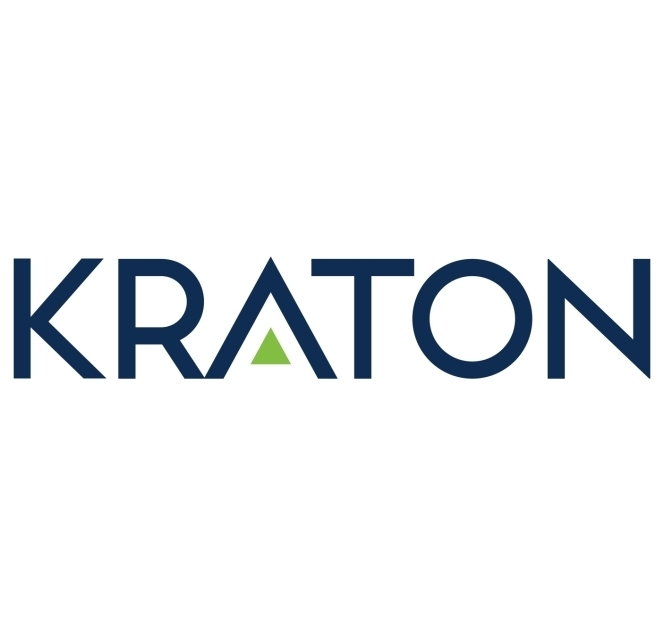
Kraton Corporation, a leading global producer of speciality polymers and high-value bio-based chemicals derived from pine wood pulping co-products, has achieved International Sustainability and Carbon Certification (ISCC) PLUS for its manufacturing facility in Panama City, Florida, United States. This independent certification tracks sustainable materials via a mass balance approach. The achievement allows Kraton to issue a formal ISCC PLUS Sustainability Declaration with shipments of its biobased polyterpene resins, providing its customers with the documentation needed to validate the renewable content in their own products.
The Panama City site becomes the company’s fourth production plant to gain this certification, building upon a commitment that started with the certification of its Sandarne, Sweden, facility in 2021. By securing these certifications across its network, Kraton strengthens its leadership in supplying circular and renewable solutions. This effort supports broader industry shifts, as customers can now more seamlessly integrate verified, sustainable materials into their supply chains and end products.
Ultimately, the company’s pursuit of such certifications aligns with a larger transition towards a more sustainable and circular economy, demonstrating how specialised chemical producers can enable tangible environmental progress through verified chain-of-custody systems.
Lana Culbert, Kraton Pine Chemicals VP of Marketing, said, “Our SYLVARES™ and SYLVATRAXX™ brands feature a portfolio of high-performance polyterpene resins. They are widely recognised for their use in adhesives and tyre applications, yet their versatility extends to other industries, like agriculture, with more opportunities ahead. While we can measure bio-based content of our pine chemicals using Carbon-14 analysis, certifying our Panama City facility under ISCC PLUS strengthens supply chain transparency, supporting the growth of the circular economy.”
Solvay Opens Europe’s First Bio-Circular Silica Facility In Italy
- By TT News
- January 30, 2026
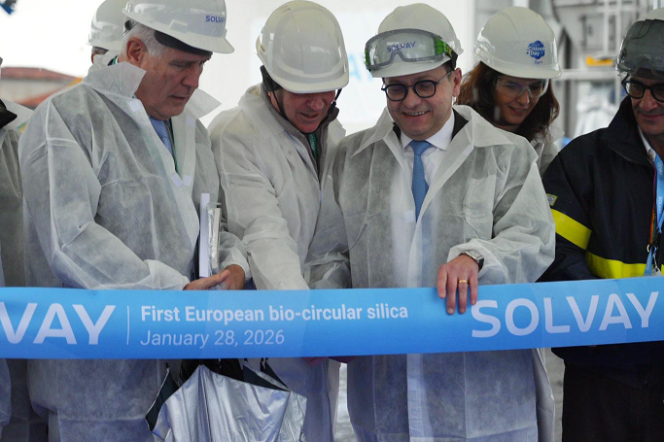
Solvay has inaugurated its new bio-circular silica facility at its plant in Livorno, Italy, a strategic investment that underscores Italy’s industrial leadership in green innovation. The facility directly anticipates evolving EU sustainability rules for tyres and supports the ambitious environmental goals of Solvay’s customers. By establishing this operation, Solvay positions itself as a proactive partner in achieving the objectives of the European Green Deal and upcoming product regulations.
The site manufactures highly dispersible silica using an innovative process that transforms rice husk ash, an agricultural byproduct, into a valuable bio-based raw material. This method creates a local circular economy, benefits the agricultural sector, and reduces associated CO₂ emissions by 35 percent compared to conventional production.
This initiative is a cornerstone of Solvay's global strategy to transition all its silica production to certified circular raw materials by 2026. While the Livorno site is the first to use rice husk ash, other global plants will utilise different local waste streams. For the tyre industry, adopting this circular silica already enables tyres to contain up to 15 percent recycled or renewable content, providing significant progress towards the sector’s 2030 material targets.
Beyond compliance, the silica produced is essential for developing energy-efficient tyres that lower rolling resistance, thereby reducing fuel consumption and extending electric vehicle range. The Livorno facility thus reinforces Solvay's market leadership in sustainable silica and highlights Italy’s vital role in the company’s broader portfolio of green investments, including projects in green hydrogen and circular soda ash.
Philippe Kehren, CEO, Solvay, said, “By acting now, Solvay is helping tyre manufacturers prepare for future EU requirements and meet their own sustainability goals. Livorno is a tangible example of how we turn circular economy principles into industrial reality, enabling progress for generations.”
Jana Striezel, Head of Purchasing at Continental Tyres, said, "Solvay has managed to transform an agricultural byproduct into a high-performance material on an industrial scale. We are looking forward to integrating more and more rice husk ash silica as a recycled material in our tyre production and are very satisfied with its performance. We are keen on innovative, renewable and recycled materials because they support our ambitious sustainability roadmap.”
An Nuyttens, President of Solvay’s Silica business, said, “Livorno sets a benchmark for circular innovation in Europe and beyond. Our goal is clear: wherever Solvay produces silica, we will integrate circular materials to reduce environmental impact and support our customers’ sustainability objectives.”
Ecolomondo Achieves Record Tyre Recycling Milestone
- By TT News
- January 30, 2026
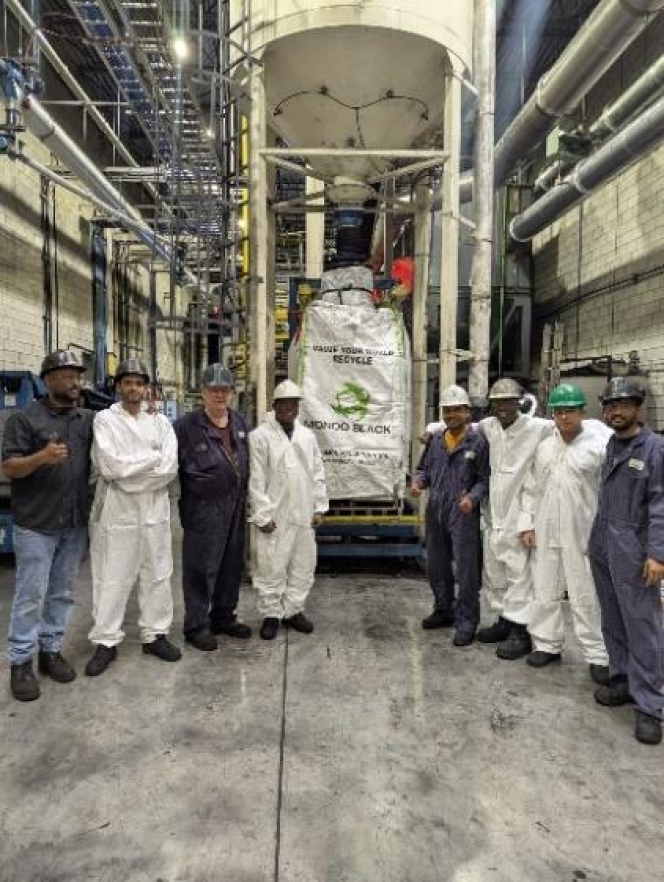
Ecolomondo Corporation, a Canadian developer of sustainable technology for recycling scrap tyres, has announced that its Hawkesbury facility reached a key operational milestone during the week of 12 January 2026, by successfully completing a record five double processing batches. This progress signifies a major step forward as the company advances towards full commercial production at the plant. Utilising its proprietary Thermal Decomposition Process (TDP) and a new automated Human-Machine Interface system, the facility maintained consistent operations and produced high-quality recovered materials.
The week’s activity led to the recycling of an estimated 9,375 scrap tyres, processing a total of 150,000 pounds (approximately 68,038 kg) of rubber feedstock. From this, approximately 60,000 pounds (approximately 27,215 kg) of recovered carbon black and 75,000 pounds (approximately 34,019 kg) of tyre-derived oil were generated, alongside syngas used to power the process itself.
As a Canadian leader in tyre recycling technology, Ecolomondo views these results as a strong validation of the scalability and reliability of its proprietary TDP system, underscoring the ongoing ramp-up at its Hawkesbury TDP facility. This consistent performance enhances the company's position in the circular economy, turning a challenging waste stream into valuable industrial commodities and demonstrating the commercial viability of its innovative approach.
- Association of Natural Rubber Producing Countries
- ANRPC
- Natural Rubber
- Monthly NR Statistical Report
ANRPC Publishes Monthly NR Statistical Report For December 2025
- By TT News
- January 29, 2026
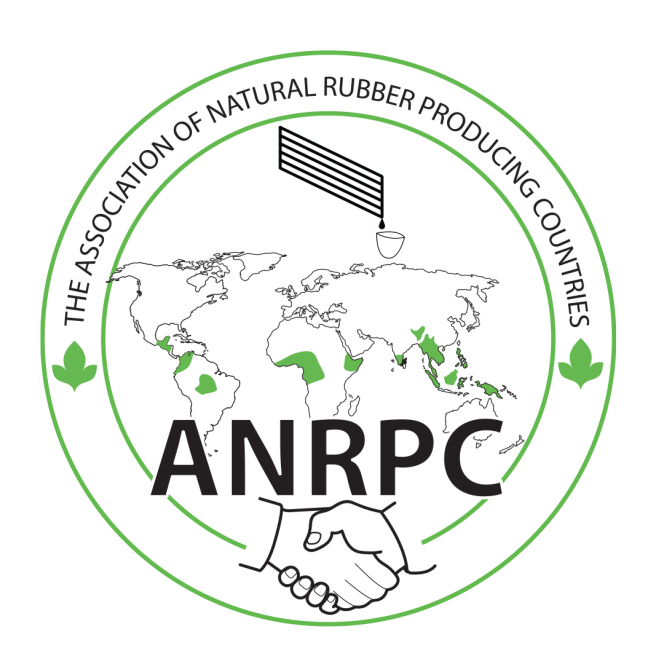
The Association of Natural Rubber Producing Countries (ANRPC) has released its Monthly NR Statistical Report for December 2025, providing an overview of key developments in the global natural rubber sector.
As per the report, the natural rubber market is positioned in a strategic accumulation phase that belies superficial price indicators. A critical analysis reveals that while US Dollar-denominated prices showed a slight pullback, this was overwhelmingly due to the appreciation of the Thai Baht rather than a decline in intrinsic value. In Thailand, a key producing nation, local currency (THB) prices remained fundamentally firm, underscoring a resilient domestic price floor that continues to support the long-term upward trend.

This underlying market strength is concretely evidenced by price movements in Malaysia. During the reported period of consolidation, Malaysian SMR-20 prices increased by 2.08 percent and latex prices rose by 2.35 percent. These gains in a major producing hub directly contradict a bearish narrative and confirm that underlying global demand continues to outpace available supply. The current market behaviour is therefore characterized as a ‘cumulation pullback’, a necessary corrective foundation following earlier strong gains, designed to build liquidity before the next advance.
Fundamental data supports this outlook. Global natural rubber production for 2025 is anticipated to grow by a modest 1.4 percent. Although the latest demand figures show a marginal adjustment of -0.7 percent, overall market sentiment remains resilient, bolstered by clear recovery signals from the tyre industry. Critically, the market is now entering the seasonally tight ‘wintering’ period from February to May, when latex production naturally declines. The consolidation and strategic accumulation observed in December 2025 have thus established a solid platform. With supply set to contract and demand holding firm, all conditions are aligned for a sustained price rally as the market moves into early 2026.







Comments (0)
ADD COMMENT